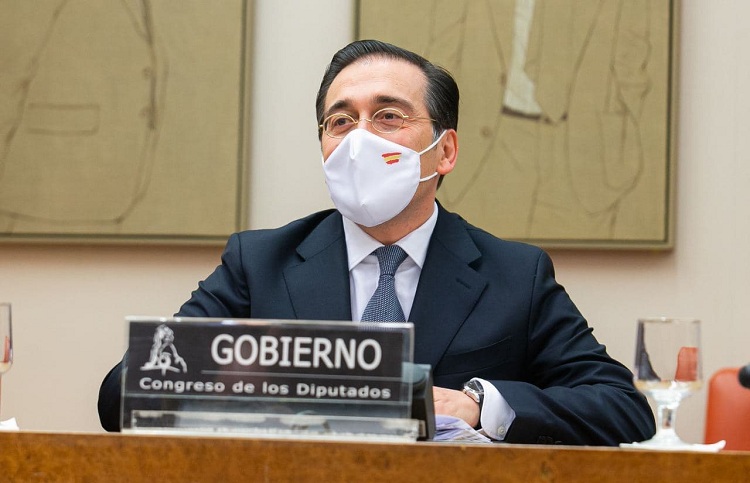The Diplomat
The Spanish Minister of Foreign Affairs, José Manuel Albares, demanded yesterday in Congress that the Spanish political forces demonstrate with regard to Ukraine the same “unity that has been possible in Europe and with the transatlantic allies”. For its part, the PP stated that Spain cannot be a “credible and reliable” partner with a Government that does not speak “with one voice” on this conflict and Unidas Podemos expressed “all its support” to the Executive if it bets for peace and demanded a regime of “neutrality” for Ukraine, outside the Atlantic Alliance.
Russia is “a threat” to Europe and to the world and its requests to the West to “isolate Ukraine are unacceptable”, said the Minister during his appearance before the Foreign Affairs Committee of the Congress to explain, at his own request, the current crisis between Ukraine and Russia. Moscow has demanded guarantees that Ukraine will not join NATO and that all NATO troops deployed in countries that joined after 1997 will be withdrawn. “All this is unacceptable, violates international legality and is a threat to peace,” Albares warned. The aim of these demands, he added, is to “block NATO enlargement” and regain Russia’s former “sphere of influence.”
According to Albares, the deployment of more than 100,000 troops on the border with Ukraine “is not justified on defensive grounds” and, therefore, “any Russian aggression against Ukraine would be a very serious violation of international law and should have a forceful response” channeled through “means other than military ones”, such as the imposition of “massive sanctions” that would have a “high cost” for Vladimir Putin’s regime.
According to Albares, the Government acts “as the Spanish people want”, through “dialogue and peaceful resolution of conflicts”, “European and transatlantic solidarity”, “respect for international law” and respect for the “sovereignty and territorial integrity of Ukraine”. “We do not want to contribute to military escalation,” but there are “red lines” or “unrenounceable principles,” such as the right of every sovereign state to choose the military alliances it wishes, he warned. Therefore, although “Spain aspires to have the best relations with the Russian Federation”, “it must also be clear that it will always act firmly in defense of international legality”.
In this context, he warned, Spain cannot “disengage” from its commitments to the EU and NATO, and for this, it is necessary that there be “unity also in Spain” regarding this crisis. “That what has been possible in Europe and with the transatlantic allies is also possible with the Spanish political forces,” he said.
PP and Unidas Podemos
During her intervention, the PP spokeswoman in the Foreign Affairs Committee, María Valentina Martínez Ferro, criticized the fact that the appearance has taken place in Committee and not before the plenary and warned that it is the President of the Government, Pedro Sánchez, who must give the explanations. He also regretted that the head of the Executive has not yet contacted the leader of the PP, Pablo Casado, to talk about Ukraine and asked the minister how he can pretend that Spain can be a “credible and reliable” partner with a government that does not speak “with one voice” on this conflict, in reference to the discrepant positions that Unidas Podemos has shown with respect to its socialist partners in the Executive.
One of the most awaited interventions, after the controversial statements of the last few days, was that of the PSOE’s partner in the Government, Unidas Podemos (UP), whose spokesman in the Foreign Affairs Committee, Antón Gómez-Reino, defended “diplomacy, de-escalation and even the demilitarization of areas of Europe” and assured that the Government will have “all the support” of his party to “build a policy of peace”. He also criticized Putin’s “ultranationalist drifts” but, at the same time, he rejected NATO’s expansion towards the East and bet on “nurturing for Ukraine a regime of neutrality similar to that of Finland” and outside the Atlantic Alliance.






